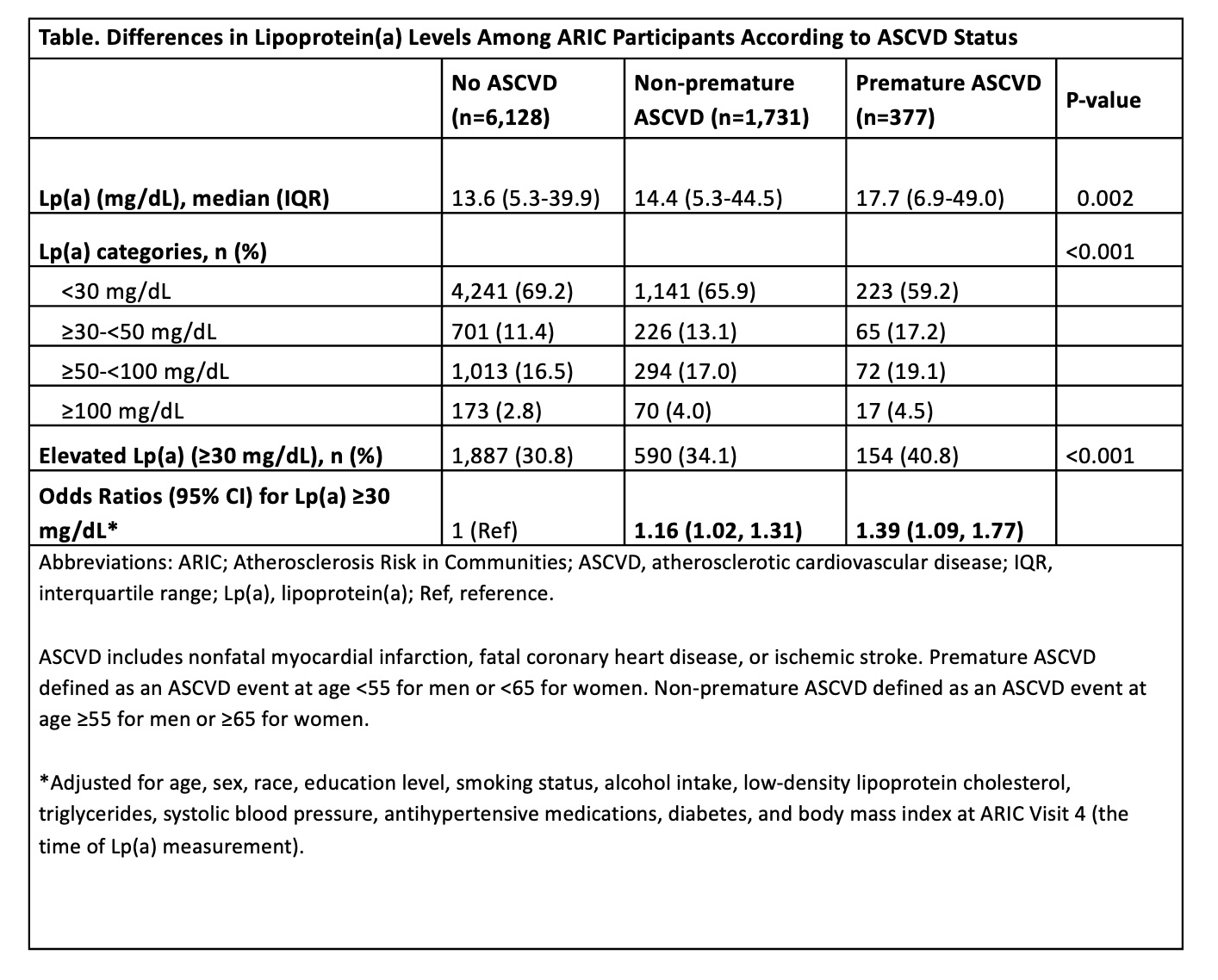Final ID: P2072
Lipoprotein(a) Levels in Premature Versus Non-Premature Atherosclerotic Cardiovascular Disease: The Atherosclerosis Risk in Communities (ARIC) Study
Abstract Body: Background: Lipoprotein(a) [Lp(a)] is a causal, predominantly genetically determined risk factor for atherosclerotic cardiovascular disease (ASCVD). Approximately 20-30% of the global population have Lp(a) levels in the atherogenic range, with prospective data demonstrating a dose-response association of Lp(a) levels with ASCVD risk. However, there are relatively limited data characterizing the relationship between Lp(a) and premature ASCVD in epidemiologic cohort studies.
Methods: We evaluated participants in the ARIC study with available Lp(a) measurements, collected at ARIC Visit 4 (1996-98). We used continuous follow-up and adjudication for ASCVD events (nonfatal myocardial infarction, fatal coronary heart disease, or ischemic stroke) from 1987 through 2021 to categorize participants as having had premature ASCVD events (events by age <55 for men, <65 for women), non-premature ASCVD events (age ≥55 for men, ≥65 for women), or no ASCVD events. Lp(a) levels were categorized according to previously established cutpoints: <30, ≥30 to <50, ≥50 to <100, and ≥100 mg/dL and compared across those with non-premature ASCVD, premature ASCVD, and no ASCVD. Elevated Lp(a) was defined as ≥30 mg/dL, and multivariable-adjusted logistic regression models were used to assess the association of elevated Lp(a) with ASCVD status.
Results: Among 8,236 participants (mean age 58 yrs, 71% female, 24% Black adults), those with premature ASCVD had the highest median Lp(a) levels (17.7 mg/dL), followed by non-premature ASCVD (14.4 mg/dL), and no ASCVD (13.6 mg/dL) (p = 0.002) (Table). Elevated Lp(a) levels were found in 40.8% of participants with premature ASCVD, compared with 34.1% in non-premature ASCVD, and 30.8% without ASCVD (p <0.001). Participants with premature ASCVD had the highest odds of elevated Lp(a) relative to those with no ASCVD (OR: 1.39 [95% CI: 1.09-1.77]), while participants with non-premature ASCVD had a lesser, but still significantly higher odds of elevated Lp(a), compared to those with no ASCVD (OR: 1.16 [1.02-1.31]).
Conclusion: Among ARIC study participants, premature ASCVD is associated with the highest prevalence and odds of elevated Lp(a). These findings reinforce the importance of the broader adoption of current guidelines that recommend systematic screening for elevated Lp(a) among individuals with premature ASCVD.
Methods: We evaluated participants in the ARIC study with available Lp(a) measurements, collected at ARIC Visit 4 (1996-98). We used continuous follow-up and adjudication for ASCVD events (nonfatal myocardial infarction, fatal coronary heart disease, or ischemic stroke) from 1987 through 2021 to categorize participants as having had premature ASCVD events (events by age <55 for men, <65 for women), non-premature ASCVD events (age ≥55 for men, ≥65 for women), or no ASCVD events. Lp(a) levels were categorized according to previously established cutpoints: <30, ≥30 to <50, ≥50 to <100, and ≥100 mg/dL and compared across those with non-premature ASCVD, premature ASCVD, and no ASCVD. Elevated Lp(a) was defined as ≥30 mg/dL, and multivariable-adjusted logistic regression models were used to assess the association of elevated Lp(a) with ASCVD status.
Results: Among 8,236 participants (mean age 58 yrs, 71% female, 24% Black adults), those with premature ASCVD had the highest median Lp(a) levels (17.7 mg/dL), followed by non-premature ASCVD (14.4 mg/dL), and no ASCVD (13.6 mg/dL) (p = 0.002) (Table). Elevated Lp(a) levels were found in 40.8% of participants with premature ASCVD, compared with 34.1% in non-premature ASCVD, and 30.8% without ASCVD (p <0.001). Participants with premature ASCVD had the highest odds of elevated Lp(a) relative to those with no ASCVD (OR: 1.39 [95% CI: 1.09-1.77]), while participants with non-premature ASCVD had a lesser, but still significantly higher odds of elevated Lp(a), compared to those with no ASCVD (OR: 1.16 [1.02-1.31]).
Conclusion: Among ARIC study participants, premature ASCVD is associated with the highest prevalence and odds of elevated Lp(a). These findings reinforce the importance of the broader adoption of current guidelines that recommend systematic screening for elevated Lp(a) among individuals with premature ASCVD.
More abstracts on this topic:
A Health Coach-Based Multi-Level Personalized Strategy Lowers LDL-Cholesterol and Enhances Lipid Control in Veterans with Atherosclerotic Cardiovascular Disease – The VA Lipid Optimization Reimagined Quality Improvement Project at VA New York Harbor Healthcare System
Chen Tina, Ingerman Diana, Haley Leah, Salovaara Priscilla, Nicholson Andrew, Illenberger Nicholas, Natarajan Sundar
A platelet biosignature in psoriasis associates with enhanced cardiovascular riskDrenkova Kamelia, Lo Sicco Kristen, Berger Jeffrey, Garshick Michael, Kazatsker Filipp, Muller Matthew, Schlamp Florencia, Luttrell-williams Elliot, Liberow Sarah, Mcgirl Siobhan, Kennedy Lauren, Garelik Jessica

